A survey of four constituencies in the Greater Accra Region that have since 1996 voted voted for the winning party in the presidential elections indicates that for presidential candidate of the New Patriotic Party (NPP), Nana Akufo-Addo is likely to win in three of the four constituencies, with one going for President John Dramani Mahama.
The survey which sampled from 480 respondents from the four constituencies, showed that a larger percentage of voters in Ledzokuku, Krowor, Ablekuma Central preferred the NPP candidate while incumbent President Mahama led in Klottey Korle.
The survey showed that 54.2 percent of respondents in the constituencies were likely to vote for NPP while 36 percent said they were likely to vote for the NDC. 4.7 percent in the December 7 poll.
The data which was collected in the second week of November, 2016 was evenly balanced between men and women, with 33 percent being between ages 25-35 and 25 percent between 36-45.
While 18 percent of the respondents were between ages 18-24 and 13 percent were between 46-45.
The survey also shows that President Mahama and Nana Addo has equal name recognition among 23 percent each of prospective voters, while Dr. Papa Kwasi Nduom had a 19.7 percent name recognition.
The National Democratic Party’s (NDP)Nana Konadu Rawlings had a 12.7 name recognition among voters while Ivor Greenstreet had 9.6 percent.
When asked who they voted for in 2012, 48.7 of those surveyed said they had voted for the NDC while 41.6 named the NPP.
54.2 percent for Nana Addo, 36.5% for Mahama
About 54.2 percent of the respondents indicated that they were likely to vote for the NPP, while 36.5 percent said they were likely to vote for the NDC.
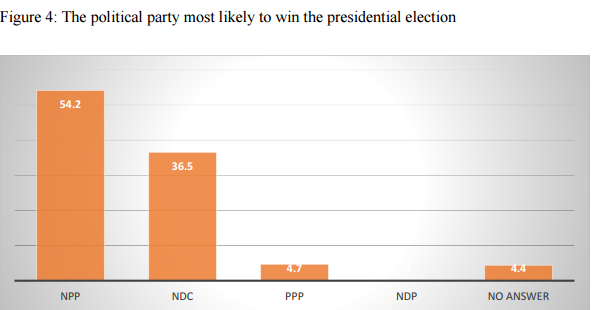
“Interestingly, while 4.7 and 0.2 percent said they were likely to vote for the PPP [Progressive People’s Party] and NDP [National Democratic Party] respectively, none of the respondents indicated that they were likely to vote for the CPP,” the survey revealed.
The constituencies, per figures from Ghana’s voting history include, Korle Klottey, Krowor, Ledzokuku and Ablekuma Central.
120 respondents were drawn from each of the four constituencies for the survey.
78.3% respondents voted in 2012
It was discovered through the survey that of the 480 respondents involved in the study, 78.3 percent may have voted in the 2012 general election.
Of the 78.3 percent, 48.7 percent of them reported that they voted for the National Democratic Congress (NDC); making the NDC the winner of the presidential polls for those four constituencies when they are combined.
41.6 percent said they voted for the New Patriotic Party (NPP) and 3.2 percent indicated that they voted for the Progressive People’s Party.
We vote for development
Majority of the respondents, 379 who may have voted in 2012 general elections said the issue of development was prominent among the reasons why they voted.
24.6 percent of them reported that they voted for a particular candidate because they believed that that the person was in the position to bring them development.
16.7 percent indicated that they voted for a candidate or party because of their allegiance to that person or party.
10.3 percent said they voted simply because they wanted to cause a change of government.
Parliamentary survey results:
Findings Korle Klottey constituency
In the Korle Klottey constituency, of the 120 respondents involved in the study, 87 percent said they knew the name of at least one of the 2016 parliamentary candidates for the constituency.
The significant finding in Korle Klottey was that Zenator Rawlings was the candidate who was most popular in that constituency with 40.7 percent recognition. She was followed by Philip Addison who polled 32.9 percent. Nii Noi Nortey ranked third with 24.8 percent.
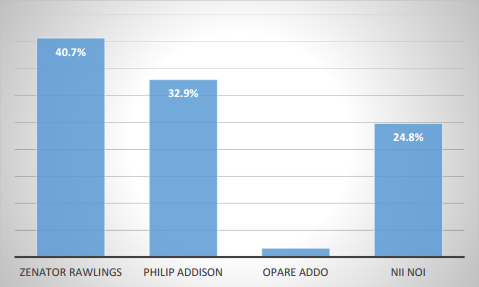
About 13 percent also said they did not know the name of at least one of the parliamentary candidates. Of the number 73. 3 percent said either they were simply not interested in knowing who the parliamentary candidates were or they did not pay attention to news or information on the parliamentary candidates or they had forgotten their name. 20 percent of the respondents did not give any reason for not knowing the names of their parliamentary candidates. And 6.7 percent said they did not bother to know the names of at least one of the parliamentary candidates because they were poised to vote for whoever represented the political party of their choice.
Findings from Ledzokuku constituency
In the Ledzokuku constituency, 72 percent of the respondents reported knowing the names of at least one of the parliamentary candidates for the constituency.
The name recognition was evenly split between Sena Okity with 47.4 percent while the NPP’s Okoe Boye had 46.2 percent. 4.6 percent of the respondents were able to name Steven Quaye as one of the aspiring parliamentary candidates of the Ledzokuku constituency.
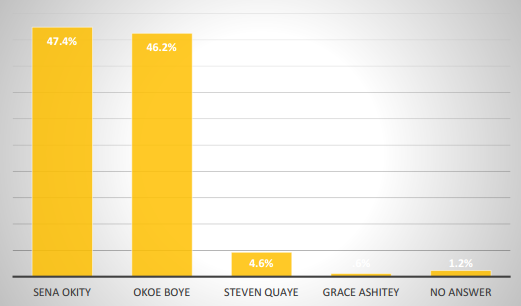
And 0.6 percent of the respondents named Grace Ashitey as one of the aspiring parliamentary candidates.
Ablekuma Central
In the Ablekuma Central constituency, only 62 percent of the respondents said they knew the name of at least one of the parliamentary candidates for the constituency.
The outgoing Member of Parliament had a higher recognition that his party, the NDC’s candidate with 50.7 percent. He was followed by Eben Nartey, the NPP’s candidate with 49.3 percent.
This percentage was the lowest recorded among all the four constituencies which were studied within the Greater Accra Region
Out of the 62 respondents who were confident that they could name at least one of the 2016 parliamentary candidates for the Ablekuma Central constituency, 50.7 percent named the incumbent Member of Parliament (MP) while 49.3 percent named the NPP candidate, Eben Nartey.
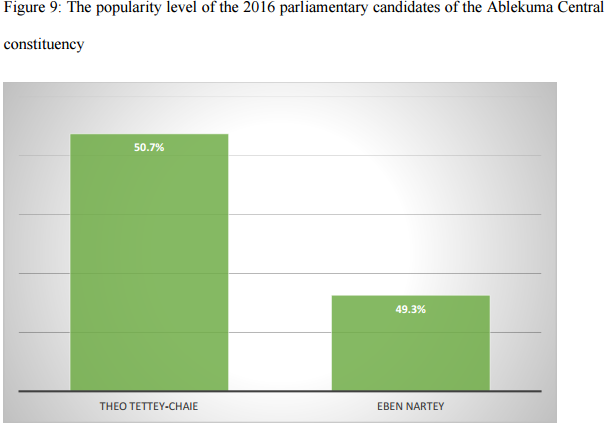
The survey revealed that of the 38 percent of the respondents who said they did not know the name of at least one of the 2016 parliamentary candidates for the constituency, 50 percent reported that they did not know because they were either not interested in the parliamentary elections, did not pay attention to information on the parliamentary candidates or they had forgotten the names of the candidates. 21. 6 percent also said it was unnecessary to know their names since they would vote for whoever represented their preferred political party. And 13.1 percent indicated that they could not name the 2016 parliamentary candidates because the candidates were not as popular as the presidential candidates.
Findings in Krowor
58 percent as against 42 percent of the respondents said they knew the name of at least one of the parliamentary candidates for the Krowor constituency.
In Krowor, the NPP’s Elizabeth Aforley Quaye had a better name recognition of 52.8 percent, thus making the most popular of the parliamentary candidates than her NDC opponent, Agnes Naa Momo who secured 41.6 percent. The PPP’s Hubert Hugo Huppenbauer (5.6 percent).
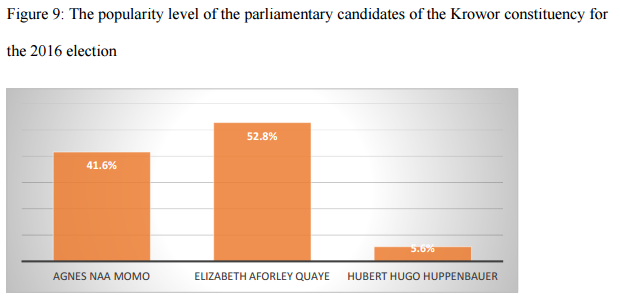
These were the only three parliamentary candidates the respondents could name although there were other parliamentary candidates such as Fanny Amartey.
In 2012, the four constituencies were won by the NDC with the closest being Ablekuma where the NDC secured 51.8 percent of valid votes cast while the NPP had NPP had 47.5 percent.
citifmonline

Comments